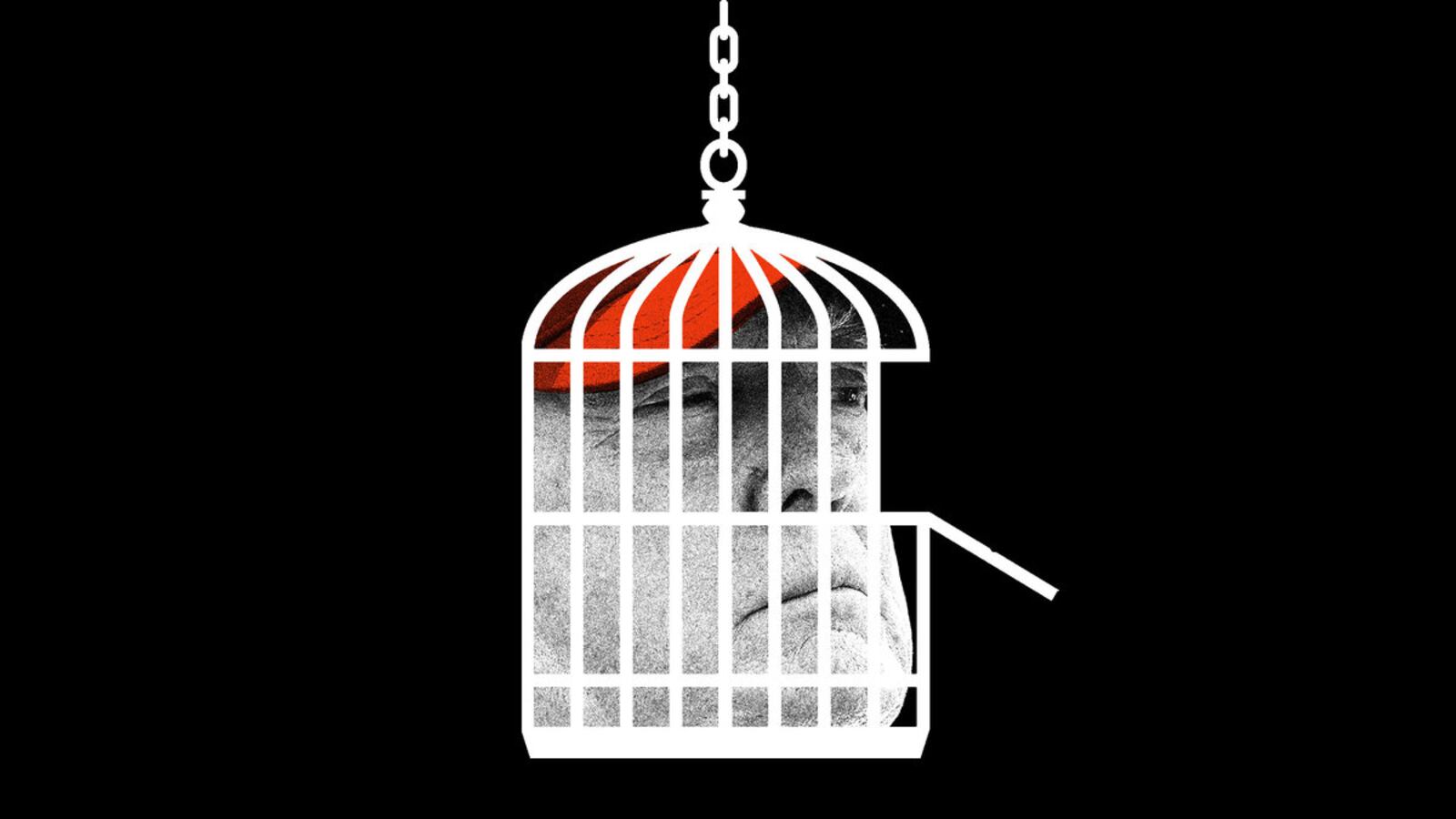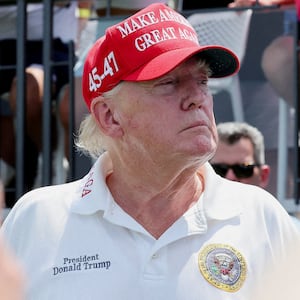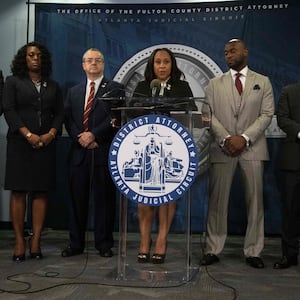Now that former President Donald Trump has been indicted in Atlanta, the countdown is on to see how long it’ll take him to try dragging the case into federal court—a tactic that, even if it doesn’t work, could still buy him time as he seeks to delay his trial.
Less than 24 hours after the new indictment was unsealed, one of Trump’s co-defendants in the case—former White House Chief of Staff Mark Meadows—tried to do just that Tuesday afternoon, arguing that the charges against him pertained to his official White House duties.
Meadows’ lawyers cited a law that allows federal officers to move state prosecutions to a federal district court as long as they’re acting “under color” of their office.
Meadows will be the first test case of this effort, and he may have a stronger argument than the former president. Whereas Trump was at the center of most of the efforts to overturn the election, Meadows’ participation in the alleged conspiracy—at least in his telling—is that he retrieved a phone number for the president to call the leader of the Pennsylvania statehouse, organized Oval Office meetings, and toured a vote-counting facility.
Trump, on the other hand, will have a much harder time arguing he was simply doing his presidential duties when he intimidated Georgia’s top elections official to drum up non-existent votes, pressured his vice president to forgo officially certifying Joe Biden’s victory, and recruited fake state electors to run a illegitimate parallel election. But even if Trump is unlikely to succeed in moving his case to a federal court, his history of legal delay tactics strongly suggests that he will at least try.
“I hope that any attempt to do so would be laughed out of the courtroom,” said Jeffrey M. Cohen, a former federal prosecutor who worked on public corruption cases and now teaches at Boston College Law School.
Still, Trump has done it before—both successfully and unsuccessfully.
As president, he did it in 2020 to slow down E. Jean Carroll’s rape case by shielding himself with the Department of Justice and, for a time, having the American taxpayers foot the bill. He tried it again this year in his porn star-hush money case brought by the Manhattan district attorney.
Lawyers familiar with Trump’s delay games largely expect him to try it again in the coming weeks. After all, his fourth indictment sounds like a federal case—alleging that he led a vast conspiracy stretching across the country while he abused his power as president to stay in power after losing the 2020 election.
While Trump faces 13 counts of violating Georgia’s state laws, much of the 98-page indictment reads like a mirror image of the third Trump indictment that was filed earlier this month in Washington federal court by Department of Justice Special Counsel Jack Smith.

All the same, Fulton County District Attorney Fani Willis has indicated she wants to put Trump—and his 18 co-conspirators—on trial in the next six months in her local state court.
But that won’t necessarily stop the former president from trying to transfer it to a federal court, where any appeals will head to a conservative Supreme Court packed with three justices he appointed while in office.
(Trump’s lawyer in Georgia, Drew Findling, did not respond to a request for comment.)
For Trump, there are obvious downsides to keeping the case exactly where it is. Trump, who has already boasted about the power of an American president to pardon themself, could see a return to the White House in 2025 as a get-out-of-jail card.
But that power only applies to federal convictions, and if he is ultimately tried in Georgia state court, that option is beyond even his reach. Keeping the case in state court also prevents anyone else from pardoning him either, given that, in Georgia, governors have no clemency power—and the state parole board only considers cases five years after someone is done serving their sentence.
Legal scholars note that there are, in theory, some federal issues Trump could raise to justify pulling it away from Georgia’s state courts. On social media and campaign speeches, he keeps arguing that his claims of 2020 election fraud—despite the fact that they were easily disprovable—are protected by the First Amendment right to free speech, which is guaranteed at the federal level by the U.S. Constitution.
But the better argument—and the one he’s more likely to make—is that every action listed in DA Willis’ indictment was actually just part of his job.
“Trump would have to show that the allegations in this case, including phone calls he made to various Georgia officials to attempt to convince them to overturn the election results, were properly within his role as president,” said Mai Ratakonda, an attorney at the election rights group States United Democracy Center.
Georgia State University law school professor Caren Morrison, a former prosecutor, noted how ridiculous that would sound.
“Here, they’ll make the argument that all of this was legitimate concern about the security of the election and he was acting under color of his job as president to just make sure,” she said. “But obviously the counter-argument to that is: It’s not within the president’s job to tell the vice president not to certify the count or call the secretary of state of Georgia to say, ‘Find me votes or whatever.’”
Meadows is of course already making similar arguments.
However, any attempt by Trump, Meadows or any of the other 17 defendants to shift the case into the federal sphere will hit even more stiff resistance than it has in the past.
Although a decades-old case allows federal officers to try cases related to their jobs in federal court, a New York federal judge considering the Manhattan DA’s case recently laid out all the reasons Trump in particular isn’t entitled to this kind of special treatment.
When kicking the Manhattan DA’s case back to state court there, U.S. District Judge Alvin K. Hellerstein issued an order in July explaining that Trump can’t just point at the presidential seal and claim immunity.
Writing about Trump’s hush money payment to Stormy Daniels, Hellerstein wrote, “The evidence overwhelmingly suggests that the matter was a purely a personal item of the President-a cover-up of an embarrassing event. Hush money paid to an adult film star is not related to a President's official acts. It does not reflect in any way the color of the President's official duties.”
Any federal judge asked to review this Atlanta case will have to consider if it was part of Trump’s official duties to relentlessly lie to the American public about non-existent election fraud, create a ploy to use fake electors, and attempt to interrupt the congressional certification of the vote. As a matter of fact, the DOJ issued a policy memo earlier this year that touches on a directly related topic—what all that activity led to: Trump’s incitement of the Jan. 6, 2021, insurrection.
In March, the DOJ answered a question put forward by the District of Columbia’s federal appellate court, issuing a policy paper asserting that there are indeed limits to an American president’s job description.
“Such incitement of imminent private violence would not be within the outer perimeter of the Office of the President of the United States,” the DOJ wrote.
As the lawyer and former diplomat Norm Eisen noted to The Daily Beast then, the DOJ essentially left Trump out in the cold by asserting that some actions by a sitting president fall far outside legal behavior.
Another potential avenue for Trump is arguing that Atlanta, which he has derided as “falling apart,” and this prosecutor, whom he has called “very corrupt,” are somehow hostile to the feds —again, on the idea that Trump was acting in his capacity as president when he desperately tried to cling to power in 2021.
Just as he did in New York recently, Trump could point to a 1989 Supreme Court decision that said a “federal officer” might succeed in removing a case from state court if they can prove "local hostility to federal authority."
But again, it didn’t work in Manhattan—and it’s not likely to work here.
On the flip side, DA Willis can present strong arguments why her case should stay in state court. At the top of the list is the idea that this is an indictment about meddling with an election. And in what may be a surprise to the average person who isn’t a constitutional lawyer, in the United States, all elections are administered at the state level.
“In the end, it was a Georgia voting law that was violated and Georgia state officials who were interfered with,” said John Felipe Acevedo, a professor at Emory University’s law school.
Perhaps most importantly though, holding a state criminal trial in federal court just isn’t… a thing.
“I don’t see any legitimate reason or legal vehicle to move a state court indictment to federal court,” Cohen repeatedly said in disbelief. “It just doesn't happen.”
No matter how stupid of an idea it is, there’s still a reason for Trump to try.
“How would it even work? Would it be taking place in federal court under Georgia's state law and rules of evidence? Who does the sentencing? District court or back to state court? It's very odd,” Morrison said. “All the defense wants is to stretch things out as long as possible, so that’s their gambit. It will cause some delay.”








